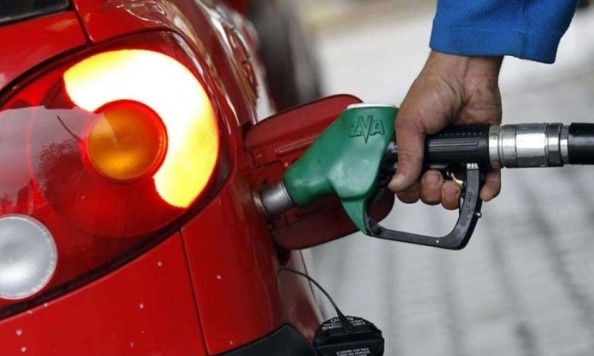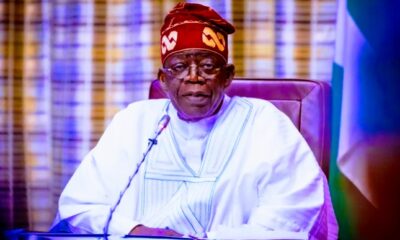Business
Marketers Hint of N800 Petrol Pump Price Amid Surging Landing Cost

Marketers of petroleum products in Nigeria have hinted that the pump price of petrol in the country could rise further to between N700 and N800 per litre, up from the current N580 – N617 per litre.
The oil marketers gave the hint in Lagos at the just-concluded Oil Trading and Logistics (OTL) Africa Downstream Expo, where they expressed their frustration over the return of a regulated petrol pricing regime amid rising landing costs, and shortage of foreign exchange.
Moderating one of the panel sessions with the topic: “Africa Fuels Update -Overview of Trends and Market Development”, Chief Operating Officer of Pinnacle Oil and Gas Limited, Mrs. Adenike Labanjo, raised the alarm over the looming price hike when she posed a question to the Executive Vice President (Downstream) of the Nigerian National Petroleum Company Limited (NNPC), Mr. Adedapo Segun.
Labanjo stated: “Now given the discussions with the panelists and taking into consideration the subsidy announcement and implementation, we saw a reduction in the consumption of petrol from about 65 million litres per day to 45 million litres per day.
“Now, with the widening gap between the NNPC costs and imports, which plus or minus, could land close to N700 to N800, how do we ensure that the illegal export of petrol does not come back? Because the gaps seem to be widening by the day with the various activities going on all over the world”. She argued that the rising cost of sourcing petrol had become more unbearable to the marketers than the NNPC because of the imbalance in foreign exchange accessibility that favours the national oil company more than the private marketers.
She added that the challenge faced by the marketers in the importation of petrol at the beginning of the deregulation pronouncement was that the market moved against them due to the volatile nature of FX or due to the inability of some marketers to lock their cargoes at the time.
Labinjo further said: “There is a major imbalance in the FX. Now, NNPC has access to that and others don’t have. NNPC too is a business on its own, but clearly, there is a competitive edge that no one in the industry can compete with. That is very clear even from the very salient points that were made today.
“We talk about things around investments even in refineries or any other type of investment on infrastructure that can support the downstream business.“With this imbalance in FX access, how can that promote investment to drive the business that we currently do, given the scenario that we see today”.In his submission, the Executive Director of Northwest Petroleum and Gas Company Limited, Dr Mohammed Salaudeen, said the high cost of sourcing petrol had led to the shutting down of 90 per cent of petrol depots nationwide.
He lamented that the cost of buying a 10,000-metric tonne of petrol locally from the NNPC and others had surged to N7 billion, up from below half of that amount last year. Salaudeen said the foreign exchange challenge facing the marketers had resulted in most of the players being unable to import petrol even with the approvals given by the government regulatory bodies to bring in their products. He categorically said that only less than 10 per cent of marketers were able to buy petrol locally while about five per cent were able to import and did so at a huge loss.
He said, “If you look at the marketing plural of petroleum marketers both at MOMAN level, DAPPMAN level even at IPMAN level, how many members of these associations are functioning today? Go to Port Harcourt, Calabar, Lagos, 90 per cent of depots are shut down, not operating. “To buy a 10,000 metric tonne of petrol locally and land the same in your terminal in Nigeria, you will need about N7 billion. Twice more than what you will need about the same time last year. So, you see what’s happening and it’s quite a lot of challenge and that’s the situation of things today.”
On his part, the Managing Director of Rainoil Logistics, Mr. Jude Nwaulune, said the cost of landing petrol in Lagos has reached about N560 – 565 per litre. Nwaulune said the cost of moving the same product from Lagos towards the company’s depot in Oghara, Delta State was about N570/litre while taking the product towards Calabar, Cross River State was around N580.
He pointed out that the challenge was basically around FX in addition to the cost of local distribution to the pumps amid the rising cost of diesel to power their trucks as diesel price now hovers around N1000 per litre.“What that means is that when we transport this product to the filling stations, you find out that the pump price is highly unaffordable. In this chain, the independents are beginning to miss from the chain because 4,000 litres of petrol used to be N7.5 million before deregulation, is now about N25 million”, Nwaulune said.
However, reacting to questions around the perceived FX imbalance and cost of doing business that favours NNPC more than other private marketers, the Executive Vice President of Downstream, NNPC Limited, Mr. Segun, boasted that the national oil company as a private integrated company has a natural edge over its competitors.
He urged other marketers to rise to the competition posed to them by the NNPC because of its competitive edge over them.“One thing I have to do quickly is remind people that NNPC Limited is not a government; NNPC Limited is not a regulator; NNPC Limited is a competitor to these guys. So, sometimes, when I get questions about what is NNPC doing to encourage, I think, we are in business to compete with other players and if we have a competitive edge which I alluded to earlier, it becomes imperative for our competitors to rise to the occasion,” Segun stated.
In line with the Petroleum Industry Act (PIA), he said the national oil company remained contractor to the government and was excellently positioned to be discharging its service of guaranteeing energy security for the country.
-

 News2 days ago
News2 days agoFG increases workers salary
-

 Entertainment6 days ago
Entertainment6 days agoPopular Nollywood Actor, Ogunjinmi Is Dead
-

 Education3 days ago
Education3 days agoJAMB releases 2024 UTME results ( See How To Check)
-

 Gists3 days ago
Gists3 days agoNigeria Ranked 6th With Largest Pen!s Size Globally (Full List)
-

 Metro/Crime4 days ago
Metro/Crime4 days agoFashion Designer, Okada Rider Die In Osogbo Auto Crash
-

 Business2 days ago
Business2 days agoCBN Sends Warning Message To OPay, Palmpay, Others Over Customers Accounts
-

 Business3 days ago
Business3 days agoLatest Dollar To Naira Exchange Rate Today
-

 Gists3 days ago
Gists3 days agoDetail Of Bobrisky’s Lifestyle In Kirikiri Prison Revealed



